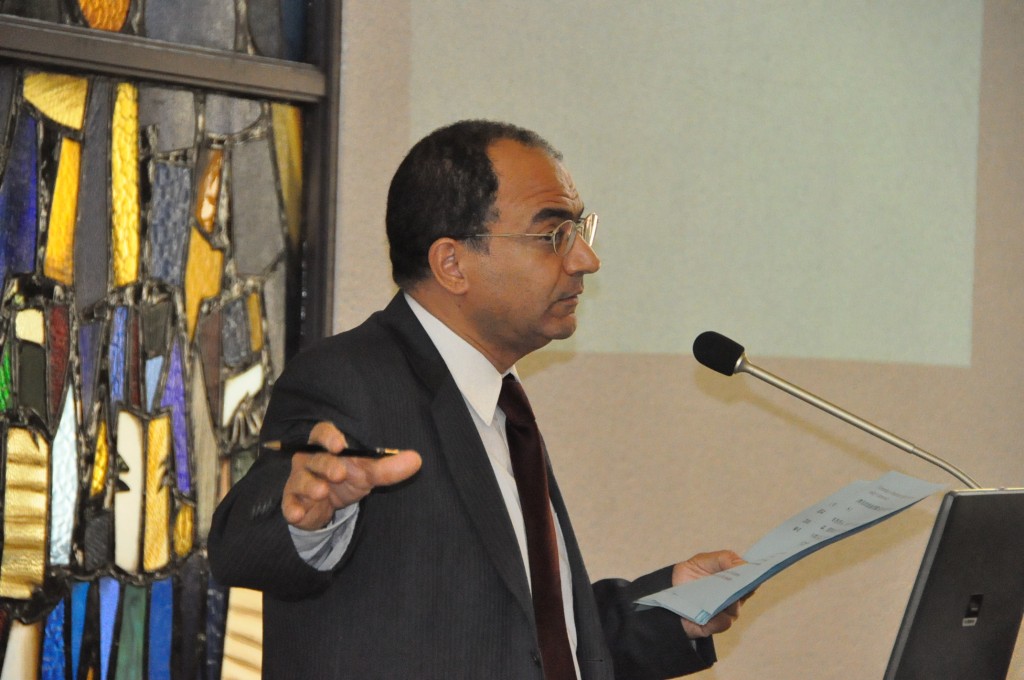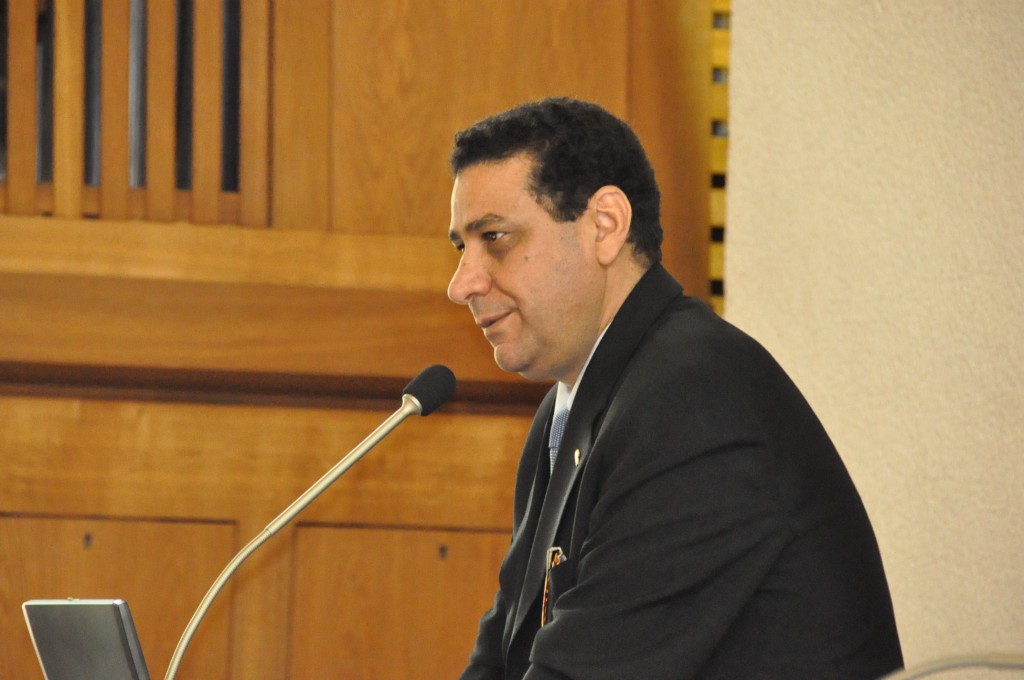Center for Interdisciplinary Study of Monotheistic Religions(CISMOR)Doshisha University
> Public Lectures > The Present Situation of Influential Media in the Middle East and their Impact : Al-Ahram newspaper and Al-Jazeera TVPublic Lectures
Co-hosted by CISMOR and SPF/SMEIF
The Present Situation of Influential Media in the Middle East and their Impact : Al-Ahram newspaper and Al-Jazeera TV
| Date: |
2010/06/17 14:00 − 16:00 |
|---|---|
| Place: | Divinity Hall Chapel, Imadegawa Campus, Doshisha University |
| Lecture: |
Kamal GABALLA, Managing Editor, Al-Ahram Newspaper Mohamed A. Shokeir, Programme Editor, Al-Jazeera English |
| Summary: | |
|
This lecture started with Mr. Kamal Gaballa giving an outline of the present situation of the media in the Arabic world and the Al-Ahram newspaper. Today, the youth population is growing in Arabic countries to the extent that young people under 21 account for more than 50% of the population in some countries. This demographic structure has a huge influence over the media industry, pressing the media to address the new view of the world held by the younger generation and to keep pace with the progress of media technology. Today, the media industry in the Arabic world needs renovation, both in terms of content and technology, and expectations are growing for such renovation. In the Arabic world, conventional media, such as newspapers and TV, as well as new digital media, have enjoyed steady growth backed by the economic development of Arabic countries; but today, the media industry suffers a decline in sales, affected by the worldwide economic crisis. It is estimated that the industry will not be able to recover its previous pace of growth until 2011. Among Arabic countries, the media industry in Egypt, home of the Al-Ahram newspaper, has been especially vigorous, against the backdrop of the increased freedom of press. In Egypt, 180 newspapers and 341 magazines were published as of 2009. Satellite TV broadcasting had also already started, making it possible to send TV programs to the entire Arabic world as well as to receive BBC broadcasts. Egyptian TV, with its special emphasis on offering political commentation and criticism, has now come to assume a “public” role in its own unique way, along with the parliament and political parties. Al-Ahram is the largest newspaper publisher among the many Egyptian media companies, with a long history dating back to 1875. Since its inception, Al-Ahram has continued to respect the “spirit of the Arab.” Al-Ahram started as a weekly newspaper in Alexandria, began publishing a daily newspaper in 1881, and relocated the head office to Cairo. Currently, they offer three local newspapers, international newspapers in London, Frankfurt, and New York, and Arabic newspapers in Dubai and Kuwait, as well as weekly and monthly magazines. Recently, they also launched an online newspaper. Despite such a vigorous situation of the Arabic media industry, however, the industry is faced with a number of problems. While TV has a huge impact on society, news programs have only a limited audience. The absence of laws that require “information disclosure” in the Arabic countries is also problematic, as this restricts the ability of the media to keep the public sufficiently informed. Journalists are exposed to the risk of being jailed for what they have said, still today. Furthermore, printed media is suffering a decrease in readership. As a result, it has become increasingly difficult for the media industry to recruit high-caliber personnel and develop the professional skills of young journalists. Mr. Gaballa concluded the lecture by pointing out these problems. Next, Mr. Mohamed Shokeir spoke about Al-Jazeera TV. Al-Jazeera TV is a satellite TV station established in 1996 under the auspices of the Qatar government. Al-Jazeera instantly gained worldwide recognition when it exclusively aired the videotaped message of Osama Bin Laden. In the Iraq War that followed, Al-Jazeera reported the damage suffered by Iraqi citizens and the abuse of American prisoners by Iraqi soldiers, which resulted in deaths—facts that the U.S. government had been hiding—and thus came into direct confrontation with the U.S. government. Additionally, Al-Jazeera often conflicted with the Iraqi government; at one time, Al-Jazeera reporters offended the Iraqi government so much that they were expelled from the country. The hostility directed at Al-Jazeera by both the U.S. and Iraqi governments is evidence that Al-Jazeera did what they had to do as a media group. The principles of Al-Jazeera are to “communicate the voice of voiceless people” and to “communicate opposing and concurring voices equally.” To be faithful to these principles as much as possible, they make it a rule to persistently cover incidents and explore the background to such incidents in detail. Compared with such attitude by Al-Jazeera, the way the Western media covers incidents seems to lack in-depth analysis. For example, Japanese media often use the term “suicide terrorism” and simply inform the public that a dreadful terrorist attack took place. This is not the case of Al-Jazeera, as Al-Jazeera also puts emphasis on what drove those terrorists to such extreme action. In many cases, terrorists have lost land, family, and purpose due to air raids by American and Israeli bombers. Having no other means to fight back, they had no choice but to resort to suicide bombings. Al-Jazeera hopes that such a background will be more widely known to the people of the world. Of course, this does not mean that Al-Jazeera feels sympathetic to suicide bombers—what they do cannot be justified by any means—but Al-Jazeera believes that it is the responsibility of the media to explore what is behind such terrorist attacks and to report the findings to the public. In doing so, Al-Jazeera hopes to provide the audience with sufficient information to help them make judgment on their own. Mr. Shokeir emphasized that Al-Jazeera reports news from not a political but a humanitarian point of view. This principle of Al-Jazeera apparently seems to be no different than the principles of the Western and Japanese media, which uphold the diversity of values and humanism. However, listening to the lecture in which Mr. Shokeir discussed the background to the Middle East situation in grave detail but with an occasional touch of humor, we were keenly aware of what is lacking in the conventional understanding of world affairs among Westerners and Japanese people. Ryuji Fujimoto (Research Fellow, CISMOR, Doshisha University) |
|
|
*Admission Free,No reservation necessary *This lecture is given in English with translation. *Inquiry: 075-251-3972 (CISMOR) |
|
|
Program(Japanese) |
|

